
Housing First Umpqua
Rights of the Homeless
All external links, images and videos are for educational and resource purposes only and are used under the "fair use" clause of the Copyright Act. All rights reserved to the original creator of the work.
Good News! Although it may not seem like it, the U.S. Constitution protects people who are homeless.
Everyone has certain constitutional rights. A person does not lose those rights just because one becomes homeless. All of those Bill of Rights protections that protect your housed neighbors should also protect you.
Unfortunately, that does not stop cities and counties, as well as state and federal government officials from trying to pass laws that might infringe upon them. That is why there are lawyers and other homeless advocates around the country challenging many of these “acts of living laws”, like the one against sleeping, resting, sitting etc. that the federal 9th Circuit Court of Appeals ruled unconstitutional.
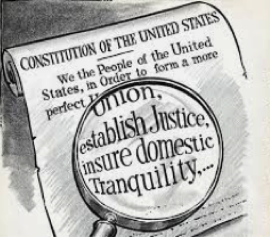
It is also why people around the country are trying to get their state government to pass a Homeless Bill of Rights, or Right to Rest Act. If we could get the state of Oregon to pass such a law, we could stop cities, like Roseburg, and counties from having laws that prohibit “camping” when someone has no place else to go.
In the meantime, if you learn about the rights you do have and how to best exercise them, you can do the most important thing to secure those rights, which is to stand up and enforce them.
Rights are only as good as your ability to enforce them. We hope some of the information we will provide here helps you do that.
Constitutional Rights

To Remain Silent
Free From Search & Seizures
To Due Process
Question & Challenge Laws
Right to Advocate for Change
Right to Rest
Just recently, the federal 9th Circuit Court of Appeals ruled that cities and counties cannot have laws that prohibit sleeping, sitting and lying down, when there is no place else for someone who is homeless to go. The court ruled that to make this a crime violates the US Constitution’s 8th Amendment that protects us all from cruel and unusual punishment.
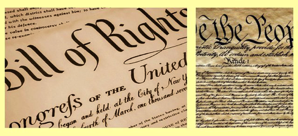
You can read the court’s decision at this link:
http://cdn.ca9.uscourts.gov/datastore/opinions/2019/04/01/15-35845.pdf
Although this decision is only law where the 9th Circuit Court has jurisdiction, it applies to states in the west, including Oregon.
This decision does not give individuals the right to set up permanent camps, but as a practical matter, that can be the end result.
If you get cited for sleeping on public property, you can challenge the charges by going to court and pleading not guilty. If you are charged with a misdemeanor, you have the right to a court - appointed attorney.
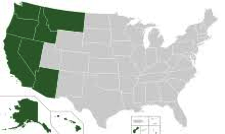
If you only get a ticket for a violation, like Roseburg’s “prohibited camping” ordinance, you do not have the right to a court - appointed attorney and will have to defend yourself in court.
NOTE: The city of Boise has appealed the 9th Circuit Court decision to the United States Supreme Court (SCOTUS). SCOTUS will soon make a decision about whether they will hear the appeal. If they don’t, the Boise decision will still be the law in Oregon.
We all have rights in the United States. Whether housed or unhoused, we also have other rights as residents of Oregon. When you are homeless, it may not seem that way, but you do.
Right to Exist & Be Left Alone
Everyone has the right to exist! In the United States, everyone has the right to be left alone by our government with few exceptions. Generally, if we are just living our lives and not doing anything illegal, we do not have to stop for, or answer questions from, the police. They really cannot even stop you without probable cause (reason to believe you may have committed, or been involved in the commission of, a crime.)
The Civil Liberties Defense Center (CLDC) in Oregon created a Know Your Rights Training, for those who are homeless. We used information from that training, and information from the American Civil Liberties Union (ACLU) to help our homeless neighbors know how to stand up for their rights.
Keep in mind, no matter what rights we have, they are only as good as our ability and willingness to protect or enforce them. Sometimes, doing this is easier said than done, but HFU can help you learn what you need to know to have your rights honored when you are homeless, using the information below as a guide*.
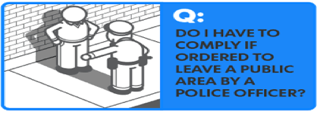
It depends. If it is just because you are standing, sitting or hanging out, not bothering anyone or obstructing others’ ability to pass, then probably no.
There are some exceptions, like if you are on active parole or probation, when you may have to comply with things the rest of us do not, like being required to respond when addressed by law enforcement. This is a different scenario, and one you should speak with an attorney about, to learn what you must do if you are on either parole or probation.
If approached by police, you can ask if you are being detained. If the answer is, “No,” you have the right to stand silent or not talk to the officer. If the answer is, “Yes,” you have the right to know the reason. It is important to remain civil, even if you believe the reason you are told you are being detained is bogus or unreasonable. You may choose to exercise your right to remain silent.
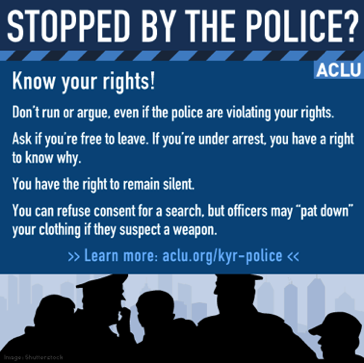
Right to Be Free From Search & Seizure
Even when one is homeless, you still have the right to have your personal possessions private. You do not have to allow anyone to search your belongings just because you are homeless. This includes tents, backpacks and other containers you use to store your personal belongings.
Your possessions cannot be seized, or taken by police, city park staff or others without some due process being given to you before this happens. This applies when you are on public property. This would include providing written notice to you.
Although local law may allow city staff to ask you to move your belongings (or your camp,) they have certain obligations to you they must fulfill before they can confiscate or take your belongings. If they do take your belongings, the law in Oregon requires them to give you at least 30-days to get them back. They must also tell you where they are and how you can get them.
Oregon Revised Statute Section 203.079:
If you cannot remain with your stuff, and must leave your belongings somewhere on public property, you can use this sign to notify police and others that the stuff belongs to someone (you,) and is NOT abandoned.
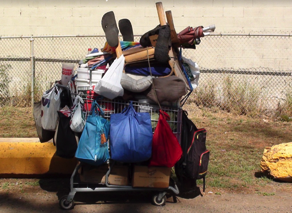
These Possessions Protected by Lavan vs Los Angeles
9th Circuit Court of Appeals
Please keep in mind, even if the law does not allow something, it does not mean it won’t happen. So, your stuff is safest when not left alone outside, even in a camp. If you have something you MUST NOT lose, keep it with you at all times, but especially if you need to temporarily leave your other belongings.
If you have had your possessions illegally taken by local police, county sheriffs, or city, county or state employees, contact Legal Aid at:
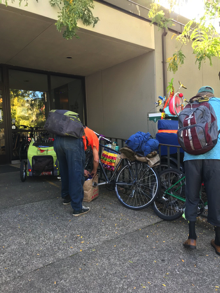
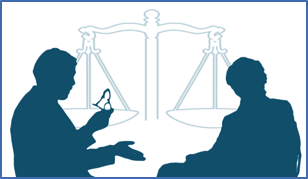
CAUTION! The information about one’s rights* is general educational information and is not legal advice. If you need legal advice about your personal situation, you must get that from a lawyer.
Fighting for the Rights of Homeless
If you want to know more about the laws that impact those who are homeless, as well as, what can be done to challenge them, please check out the information, at the links below, at this important resource:
